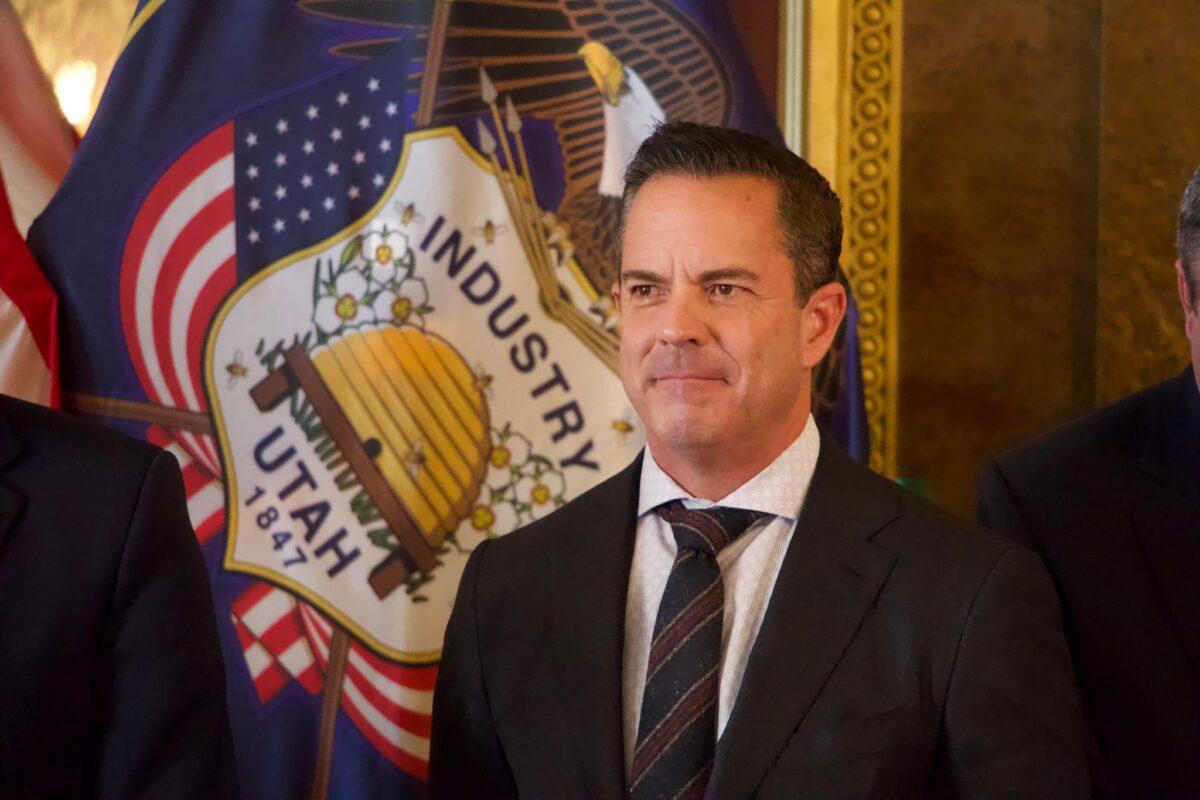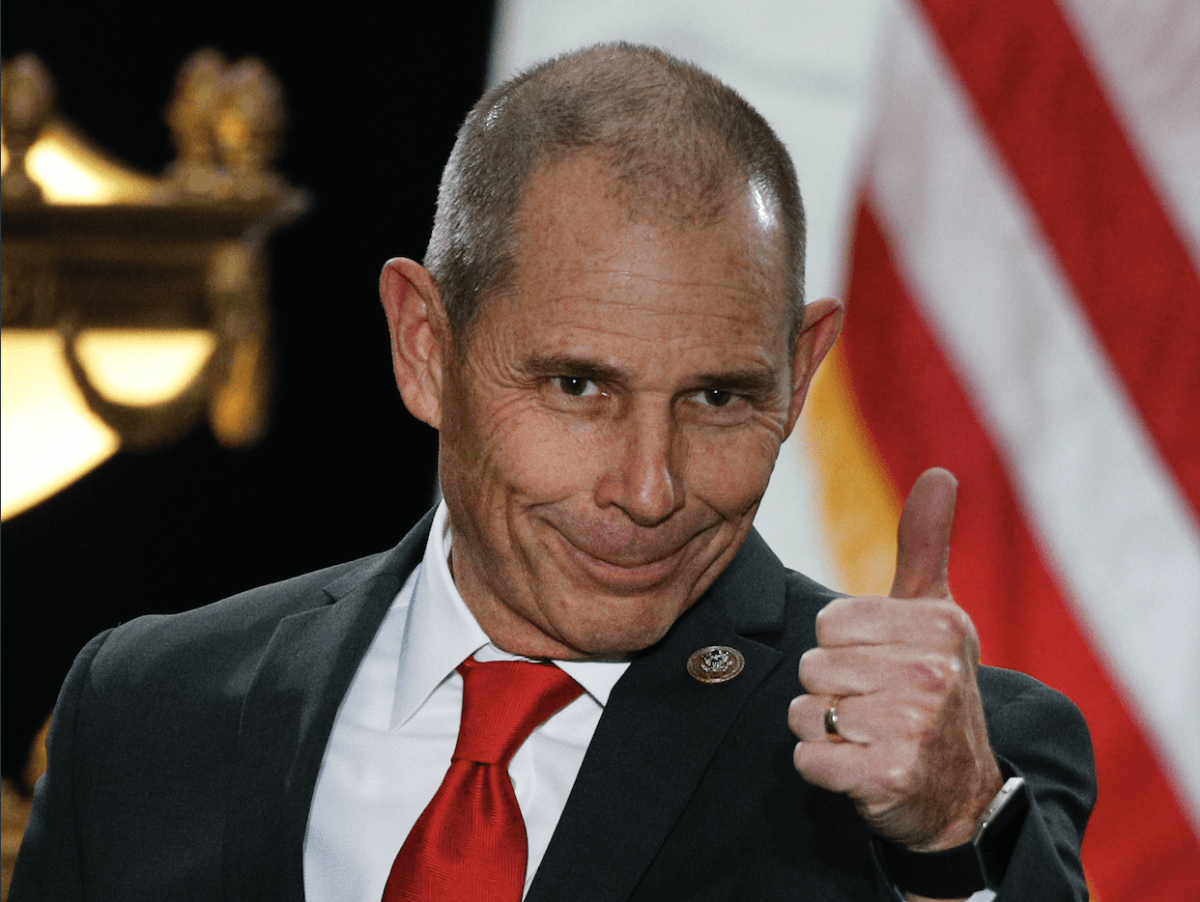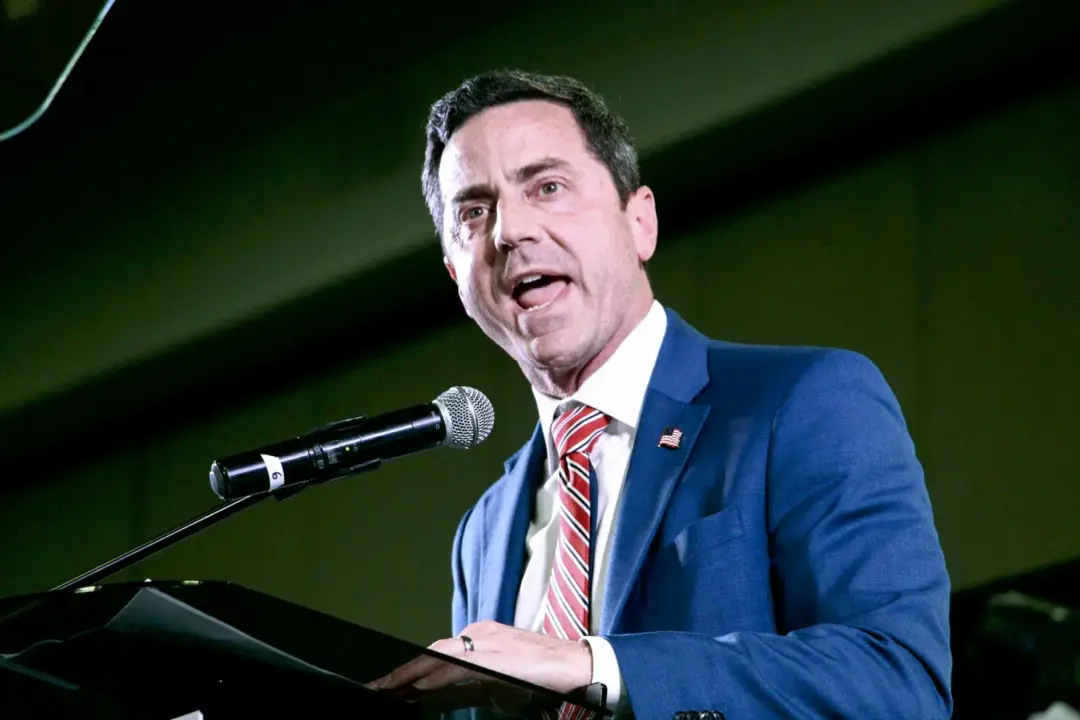Small city mayor gets former President Trump’s endorsement in June 25 contest against better-known, better-financed GOP veterans.
The Utah Republican primary to succeed retiring U.S. Sen. Mitt Romney (R-Utah) once featured 11 hopefuls. But after most failed to qualify for the ballot before the state’s GOP convention in April, voters will see four names on the June 25 ledger—including a long shot boosted by former President Donald Trump’s endorsement.
Riverton, Utah, Mayor Trent Staggs, who announced his candidacy nine months before Mr. Romney revealed in September 2023 that he’d not seek a second Senate term, was endorsed by the former president on April 28. Hours later, he notched two-thirds of the Republican convention vote to secure the party’s backing.
Will it matter? Polls and fundraising say maybe not.
By those metrics, four-term Rep. John Curtis (R-Utah) is the front-runner, with Mr. Staggs a distant third behind former Utah House Speaker Brad Wilson and ahead of Moxie Pest Control founder and CEO Jason Walton, a first-time candidate whose self-funded campaign is an insurgency against “status quo career politicians.”
The June 25 GOP primary winner will square off as the overwhelming November favorite against Democrat Caroline Gleich, an environmental activist mountaineer who secured the nod in her party’s April 28 convention.
Utah hasn’t elected a Democrat to the U.S. Senate since 1970. The Cook Political Report with Amy Walter, Inside Elections with Nathan L. Gonzales, and Larry J. Sabato’s Crystal Ball all rate the state as a safe race for the GOP U.S. Senate primary victor. Its four U.S. House seats are occupied by Republicans, and the state Legislature has red supermajorities.
Utah’s U.S. Senate election is for one of 34 upper chamber seats on 2024 ballots across the country, including 11 held by GOP incumbents. While not regarded as key to reversing the Democrats’ 51–49 Senate majority, the race has national implications.
The moderate Mr. Romney, a former Massachusetts governor and GOP 2012 presidential nominee, incurred the wrath of Trump supporters when he voted to convict him in 2020 and 2021 impeachment trials.
The retiring senator and former president are the race’s biggest issues, with candidates otherwise in near-lockstep in views and priorities. The separation is in disparaging or aligning with Mr. Romney’s centrist bipartisanship and in who would be most effective in implementing former President Trump’s agenda should he return to the White House in January 2025.
Mr. Staggs, 49, told The Epoch Times in March that he is the true MAGA candidate who launched his grassroots campaign in January 2023 specifically to take on Mr. Romney and “establishment” Republicans unwilling to push a conservative agenda in Utah.
“I was the only one that had the courage to take on Mitt Romney,“ he said. ”We challenged them. That’s typified my career, that willingness to stand up and push back against the establishment. That’s what people want.”
Although Utah voters are conservative, “there’s been some hesitancy” in embracing former President Trump in the past, Mr. Staggs said, but after four years under President Joe Biden, those reservations are gone.
“As I’m going around the state, we’ve done 60-, 70-plus town halls [by March], and … there’s a strong sense we need to get back to what was working, and it was working under President Trump,” he said.
Mr. Staggs said he’s built advantages that may not show in polls but will manifest in votes. His ground game includes knocking on thousands of doors across the state and personally calling on delegates.
As mayor of a city with 50,000 constituents, he has a ground-level view of real issues affecting real people. Another possible advantage is his status as the youngest of the candidates in the nation’s “youngest” state per capita—the median age is 31.
“That’s one of the things that’s resonated so well with our candidacy is that for 10 years now going on 11, being in local government, I have been on the front lines of pushing back against governmental overreach. … and demonstrated time-and-time again that local governance governs best,” he said.
Former President Trump, in his April 28 endorsement—which surprised many because Mr. Staggs was a relative unknown—said the mayor is “100 percent MAGA” and can best help him defuse inflation, grow the economy, and secure the nation’s border.

No Drama ‘Worker’
Mr. Wilson, 55, also pledges support for former President Trump but maintains he’d be most effective in “representing Utah to Washington, D.C., not representing Washington, D.C., to Utah,” pointing to his 2011–2023 tenure in Utah’s House of Representatives and ascension to speaker.
“I’m a worker,” he told The Epoch Times in March. “I’m not someone who likes to rush to the front of the line to get in front of a TV. I was elected to do the work, and, at times, to the chagrin of some of my staff, I’d much rather do the work.”
Low-key, no-drama effectiveness is what Utah voters want, Mr. Wilson said, noting he’s running for Congress for the same reason he ran for the state House in 2010.
“I was really frustrated with government and how government bureaucracy was hindering our ability to get things done, and I thought, ‘Well, I can sit on the sidelines and complain, or I can get involved to try to make a difference,’” he said.
Considering how fractured Congress is, especially the House, which has moved the fewest bills in nearly a century while mired in inter-partisan feuds, Mr. Wilson said Utah voters want to see things get done.
“We need to send people [to Congress] who actually know how to do the work, know how to balance a budget at the same time as cutting taxes, know how government should work, what the different branches of government’s jobs are, and is going to fight to do that,” he said.
Mr. Wilson said a good example of his approach is how his administration “reined in emergency powers during the pandemic.”
“We were not going to allow unelected bureaucrats run lives of Utahans,” he said. “We made sure we put power back into the hands of elected officials. That’s what needs to happen in Washington, D.C.”
He acknowledged some differences with the former president, such as on the infrastructure bill, but said that any claim that he’s not backing former President Trump is campaign jabber.
“There’s people who don’t like, sometimes, the way he behaves and what he says. But, boy, they liked his policies, and they were better off when he was president,” Mr. Wilson said.
“Listen, we need a president who is going to be tough. There are tough issues that need to be dealt with and we need someone who’s going to be a strong leader with … a firm grip on what needs to be done. I think Trump will demonstrate that like he did when he was president before.”

‘Independent Thinking’ Moderate
Mr. Curtis, 63, a former Provo mayor who was first elected to Congress in 2016, reiterates his support for former President Trump when asked but otherwise emphasizes differences from party rivals.
The former Democrat chairs the 83-member Conservative Climate Caucus, drawing fire from some within the party for accommodating President Biden’s “green energy” agenda in a state rich in natural gas and coal.
Some conservatives say Mr. Curtis is cut from the same moderate cloth as Mr. Romney and Utah Gov. Spencer Cox.
He’s noted in campaign stumps and while serving on the House Energy and Commerce Committee—he is the chair of the Energy, Climate, and Grid Security Subcommittee—and House National Resources Committee that Utah’s young conservatives are concerned about climate change and see firsthand how fragile their environment is as the Great Salt Lake turns into dust.
Although he has criticized the Biden administration for funneling billions into green energy development while imposing restrictions on fossil fuels, Mr. Curtis has aggressively pursued opportunities for the state to be a leader in new technologies, such as carbon capture.
“My focus has always been representing the state well in Washington, D.C. I’m in a position to be more effective than anyone else in this race,” he said when launching his campaign.
“I’ve invested deeply in relationships and have seniority others simply do not.”
Mr. Curtis touts his legislative record in the House as a preview of what he could do in the Senate, citing 15 bills he sponsored since 2017 that have become law. He is ranked by the nonpartisan Center for Effective Lawmaking as the House’s ninth “most effective” Republican.
His campaign website maintains that Utahans value “independent thinking,” not party orthodoxy, which is why he’s best suited to be Utah’s next U.S. senator.
If polls are an indication of electoral success, then Mr. Curtis’s moderate tone appears to have broader appeal than that of his party’s rivals.
According to a June 4–6 survey of 469 likely voters by HarrisX for Deseret News and the University of Utah Hinckley Institute of Politics, Mr. Curtis notched 47 percent of the tally, eclipsing Mr. Wilson at 24 percent, Mr. Staggs at 21 percent, and Mr. Walton at 8 percent
The leader in fundraising, according to his June 5 Federal Elections Commission (FEC) filing, was Mr. Wilson, who raised $4.99 million—including significant self-funded contributions—spent $4.43 million, and had $554,000 in the bank.
Mr. Curtis’s June 5 FEC filing showed $3.7 million raised, $3.52 million spent, and $575,865 cash on hand; Mr. Walton raised $2.79 million, including self-funding, spent $2.53 million spent, and had $262,000 in the bank; and Mr. Staggs raised $1.14 million, spent $765,000, and had $375,249 cash on hand.

